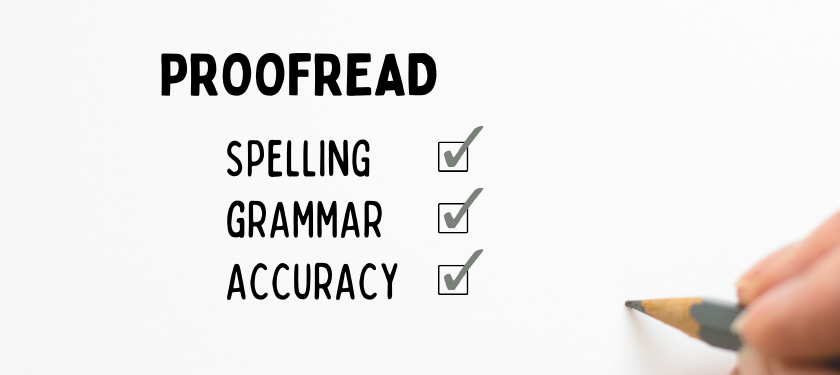
Don’t Make These 26 Common Errors on Your Next Resume or Cover Letter
It’s always best to review your job applications with a fresh set of eyes and not rely on spell check. After writing your resume and cover letter, leave them alone for a while. After at least an hour or two, come back to review your materials with fresh eyes. Carefully read every word to ensure that you did not accidentally type out the wrong word or contraction. Even better, have someone else review your resume and cover letter.
Here are the most common word mix-ups in job applications.
1. Affect vs. Effect
Affect is a verb, which means to make a difference to something. It makes a change or impact.
- My plan positively affected the company.
- New management affected morale.
Effect is usually used as a noun and is the change that resulted from an action or the cause that brought about a change.
- The NYC salary transparency law went into effect in 2022.
- New management had a huge effect on morale.
2. Advise vs. Advice
Advise is a verb, which means to recommend or give information (or advice) to someone.
- I advised clients on which product would work best for them.
Advice is a noun, which means an opinion or a provided recommendation.
- The advice that I gave improved people’s lives.
3. Confident vs. Confidant
Confident is an adjective that means having confidence, self-reliance, or showing assurance.
- I am confident that I can complete the task by the deadline.
Confidant is a noun meaning someone who is entrusted with secrets; someone you confide in.
- He is her confidant.
4. Compliment vs. Complement
Both compliment and complement can be used as verbs or nouns.
A compliment is a remark expressing admiration, esteem, or approval.
- The manager complimented her on a job well-done.
Complement refers to something that completes something else.
- The appendix complemented the report.
5. Identify vs. Identity
Identify is a verb, which means to establish or indicate who or what someone or something is. It also means to recognize or decide that you belong to a particular category.
- I identified what was causing miscommunication.
- I can identify with you because of our similar backgrounds.
Identity is a noun, which means the distinguished categories, character, or personality of an individual or a close similarity to someone or something.
- We know the identity of the next employee of the month.
- The initiative created a cultural identity.
6. Then vs. Than
Than is a conjunction or preposition that is used as a comparison of one or more things.
- There were more meetings than normal today.
- My colleague has been at the company longer than I have.
Then is an adverb that is used in relation to time. It can be an event that follows another event.
- I went to work, then I had a meeting.
7. To vs. Too. vs. Two
To is a preposition that is used to show location, distance, or motion. Use to before a verb to make the to-infinitive form.
- They went to the corporate office for the annual meeting.
- I cannot wait to meet you.
Too is an adverb that means also, more, or very.
- I went to the annual meeting too.
- I am too excited to sit still.
Two is a number.
- I supervise two direct-reports.
8. Insure vs. Ensure vs. Assure
Insure, ensure, and assure are all verbs with different meanings.
Insure means to provide or obtain protection against loss, damage, or injury.
- He insured his new home.
Ensure means to make certain that something will happen, to guarantee something.
- She ensured a smooth onboarding process.
Assure means to give someone confidence or to remove doubt.
- They assured the employees that there will be an annual cost of living increase.
9. Manager vs. Manger
A manager and a manger are both nouns. However, it is unlikely that you meant to write “manger” on your application.
A manager is a person who is responsible for organizing and overseeing people or projects.
A manger is a trough for animals to eat from. Don’t forget to include the second “a” if you are a manager!
10. Contractions: To use an apostrophe or not to use an apostrophe
A contraction is a shortened word that is made by combining two words together with an apostrophe. To avoid any errors in your application, avoid using contractions. Therefore, use “it is,” rather than “it’s.”
Tip: If you have used “its,” read the sentence aloud and replace “its” with “it is”. If the sentence doesn’t make sense with “it is” then use “its” without an apostrophe. If the sentence makes sense with “it is” then leave the words spelled out.
For example, “it’s a pleasure to meet you.” “It is a pleasure to meet you” – works
The report is in its final form.
Here are a few to look out for:
- It’s – contraction of “it is”
- Its – possessive
- They’re – contraction of “they are”
- Their – possessive
- You’re – contraction of “you are”
- Your – possessive
– Mary-kate Grohoski, Sales Manager
Put these tips to use by finding your next job on NYFA Classifieds, the go-to listings site for artists, arts administrators, and museum professionals. Follow us @nyfa_classifieds on TikTok for more creative career tips.